Paris Theatre: Prurience or Porno-Chic?
University Avenue has changed a great deal over the past 30 years, and perhaps nothing illustrates that transformation as much as the story of the Paris Theatre. The X-rated movie house operated during the 1970s at 124 University Avenue, near Alma Street and the Circle, giving Palo Alto a rather unseemly entry point to the downtown area. During its time as the city’s most visible adult theatre, the Paris would bring local context to the national debate over obscenity. While the nation’s high court grappled with what constituted “obscene” and what was protected under the First Amendment, Palo Altans struggled with what was permissible according to their own community’s standards.
As sexual mores changed throughout the country during the 1960s, X-rated movie houses, increasingly explicit girly magazines and strip clubs challenged the nation’s legal system to define exactly what constituted obscenity in a changing society. But definitions would not come easy. Using phrases like “utterly without redeeming social importance,” the Supreme Court seemed only to muddle the issue for the public and law enforcement. And porn producers were quick to circumvent High Court definitions with tricks such as slipping in passages of Shakespeare to add a little civility to otherwise carnal proceedings. Legal confusion meant that term after term, dirty books, movies, and magazines kept ending up back in the lap of the nation’s highest court, which presumably had more important business to attend to.
The court wound up making obscenity law even less clear when Justice Potter Stewart famously refused to define hard-core pornography, stating in his 1964 opinion for Jacobellis v. Ohio, “I shall not today attempt further to define [what is obscene] . . . but I know it when I see it.” Without any meaningful all-embracing definition for obscenity, the High Court was in the position of potentially ruling on virtually every obscenity arrest made for showing porn films all across the country. This led to somewhat ridiculous "movie days," in which the Supreme Court clerks joined the all-male, largely octogenarian body to eat popcorn and watch the porn movies from cases awaiting decisions.
Eventually, the court essentially gave up on such specific review, giving far more general instructions on obscenity in 1973’s Miller v. California--guidelines that have more or less stood until this day. In that case the court said that judges must look at whether the “average person, applying contemporary community standards, would find that the work, taken as a whole, appeals to the prurient interest.” But of course, even that mouthful was subject to vastly different interpretations.
Perhaps not coincidentally, as obscenity rules loosened, pornography reached its own golden age. The new porn films of the 1970s added a touch of art which allowed them to gain further acceptance in mainstream society. The 61-minute feature film “Deep Throat” was released in 1972, and its stunning popularity helped usher in a new look at pornography from mainstream culture. It was the beginning of what has been called porno-chic. Soon a series of other films tried to blend artistic sophistication with hard-core sex. As '70s porn director Ron Wertheim said, “I approached those films as if I was Luc Godard or somebody." For a time in urban areas, it even became trendy for younger moviegoers, often in mixed company, to attend porn films. Major newspapers like the New York Times and Chicago Sun-Times and magazines like Time and Newsweek began reviewing some soft-core and even hard-core movies, and many in the industry believed that the adult genre would soon blend into mainstream Hollywood.
And of course before the age of VCRs, hotel pay-per-view and the all-time heavyweight of porn content--the internet-- X-rated movie houses were the primary places where those with the aforementioned “prurient interests” could satisfy their curiosities. In the 1970s it seemed that most cities had at least one local theatre showing dirty movies. In Palo Alto, that place was the Paris Theatre, and the fact that it was right on University Avenue rankled many in town.
Opening in 1961, the Paris Theatre originally showed artsy American indies and foreign films like its opener, Jean Renoir’s Picnic on the Grass. But as profits began to sink and porno-chic took off, the double bills at the Paris regularly became adult-only affairs. By 1972 the Paris was showing such X-rated films as Ginger (“her weapon is her body”) and The School Girls, which promised to be “an intimate study of the hidden lives of our teen-age girls --- shocking, revealing, true!”
After the Supreme Court’s decision in Miller in 1973, the Paris Theatre became a target of the local PAPD. On September 21 of that year, police raided the Paris and seized its copy of The Devil in Miss Jones, one of the all-time pieces of artsy filth. Police Chief James Zurcher told the press that “based on recently decided cases, it’s apparent that exhibiting a film such as The Devil in Miss Jones is unlawful” and he had a judge’s warrant to verify the point. Still, no arrests were made and the theatre owners, San Carlos Cinema Inc., didn’t seem too worried about it. They quickly obtained another copy and continued showing the film for the rest of its scheduled run at the theatre.
Three months later the police were back at the Paris to nab the theatre’s copy of Deep Throat, which officers said violated Penal Code Section 311.2--distributing, exhibiting or advertising obscene material. Police seemed defensive about their association in such morality arrests, however, noting that the force did not have “a detail that worries about pornography” and that “it is very low on our list of priorities.”
Strangely, in 1976 Paris owner, Hal Snyder began to picket his own theatre. He claimed that Santa Clara County Superior Court Judge Edward Brady had executed the lease with San Carlos Cinema over his strong objections during a divorce action from his wife, Adrienne. Few other details were given, but he showed up with his 14- and 12-year-old sons] who Snyder said had been teased at school. They marched with signs saying, “The courts put porno in my dad’s show--then kids drove me from school.”
By the summer of 1977, the City Council was looking to relocate the headache that was the Paris Theatre. Councilman Alan Henderson floated the idea of the Paris switching locations with the family-oriented Biograph Theatre on more secluded Ramona Street or the funky Festival Cinema on Hamilton. The move was supported by San Carlos Cinema, who seemed to want to get out of the line of fire coming from increasingly hostile Palo Alto residents. One such resident, Pete Norway of the Concerned Citizens Group, objected to the move saying that “we should not encourage [the Paris] to stay in our city.”
Then, in December of 1977, discussion halted when the theatre owners decided to close the Paris. They cited the deteriorating condition of the theatre, although it seems community pressure was also a major factor. Eventually the Paris was sold for $510,000 and was remodeled for retail. Today, the rather sterile E-Trade Financial stands at the former home of Palo Alto's memorable venture into the golden age of porn.
These days, adult films in the United States generate some $20 billion in revenues and constitute two-thirds of all hotel movie purchases. As porn has continued to grow in America, it has also gone back underground. Secreted pay-per-view movies and private internet surfing have replaced the gaudy exhibitionism and flashing lights of the old X-rated theatres. And these days in Palo Alto, any chic exhibited on University Avenue is strictly confined to shoes and skirts. []
Our Reader's Memories:
believe!"
-Mal
one hour than I have had in an entire lifetime'. Brought down the house!"
-Gary
"I went there once in high school with a buddy of mine. Even though we were only 16 at the time they didn't ask for any ID. I don't remember the movie but I do remember that I was very uncomfortable being there with my male friend and it was awkward later when we left. One thing I do remember very well was that it
was the first time I ever heard a Robin Trower song - they played Too Rolling Stoned in between the flicks. I was turned on by the music as much as the movies!"
-Kevin
"My graduating year of high school, some buddies and I said we had to go to the Paris Theater once and decided to see "Deep Throat." Several years after it debuted it was still very popular/controversial. We were very nervous ... it was a different time then, lots of guilt about sex. I was very surprised that the Paris theater was big and nice. It would have been very impressive if it had been kept up. If they had remodeled it, it would have been as nice as the Stanford theater and we would have 2 nice downtown theaters to go to instead of just one, and the small Aquarius. I wonder if anyone can tell us when it was built and about its history?
Back then there was the Festival Theater, a very small place the size of a small business with bean bag chairs, couches, and easy chairs - very cozy. The projector was like the kind you had in school movies. It was very cute, they played foreign silent movies and had cartoons before the show which was phased out by all the other theaters at this time.
There was the Stanford Theater, still in operation before the sale and renovation that was still very nice.Then there was the Bijou, half of which would now be the Gordon Biersch Restaurant. It was large as well.The Aquarius which is still operational now, but it was one big theater at that time instead of two small thin
ones.
There was the fantastic Varsity Theater. They had the midnight movies and gave you a Varsity dollar every time you bought a ticket so you got a discount the next time. Many older teenage kids went there on the weekends. It was the party place. It is now Border's Books.
And there was a theater on California St. called the Fine Arts that is now a sports apparel shop. Palo Alto has changed a lot.
-Bruce
Send Us Your Memory!
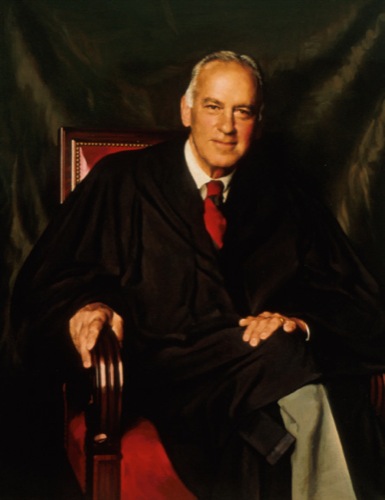
Justice Potter Stewart.
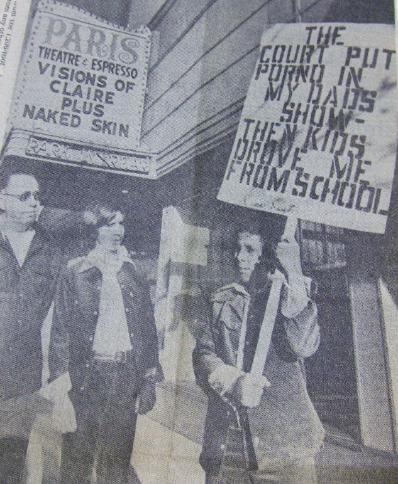
Hal Snyder and his sons picketing Synder's own theatre.
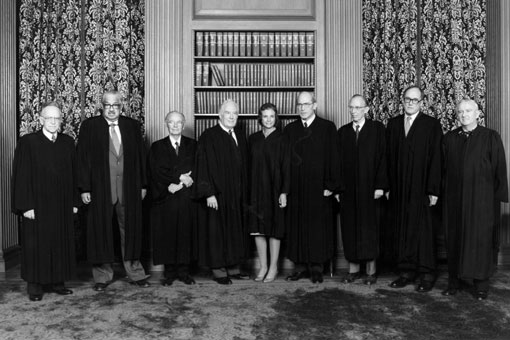
The Burger Court made lasting decisions on obscenity cases.
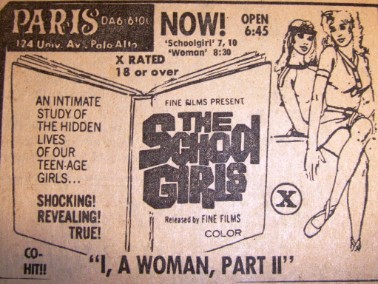
A Paris Theatre ad promotes The School Girls.
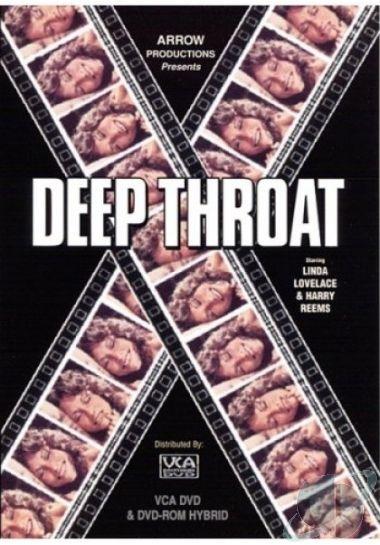
Deep Throat was confiscated by Palo Alto police in 1973.